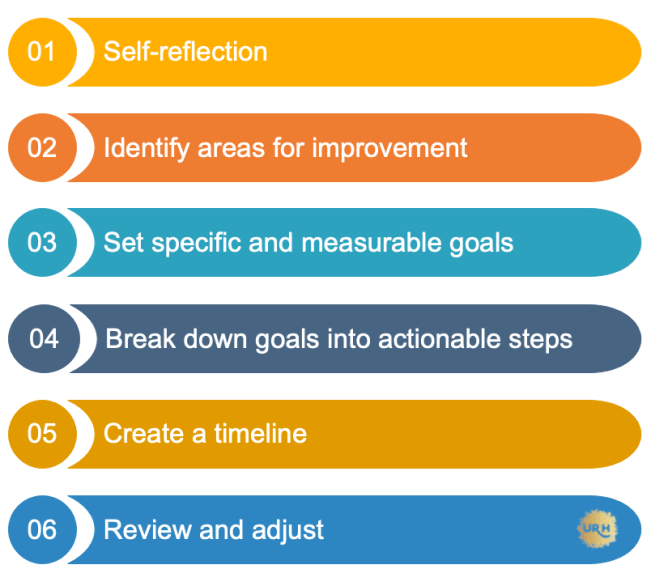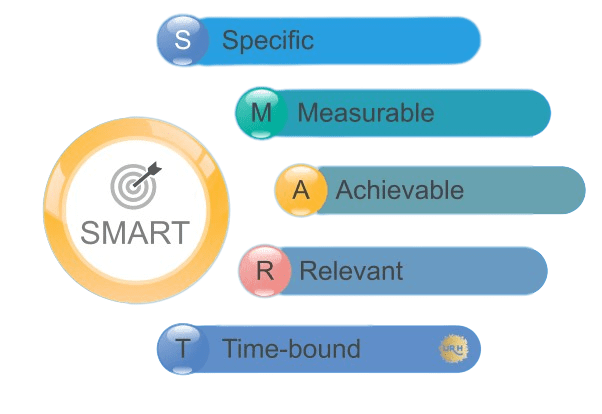How To Set Professional Goals – Top 10 Professional Goals Examples
When we look at successful people we wonder what would be the keys/secrets behind their success. Let me tell you one key is “setting professional goals”.
And if you also want to set goals for your self then this information is going to help you.
Anyone who is looking to achieve greater things and be successful in the process of doing so needs to set professional goals, as it will keep them on the path and guide them based on the milestones they achieve.
Having a defined objective/goals and plan can provide the basis for planning and taking essential steps in the direction to achieve a defined objective/goals.
What Are Professional Goals?
Every year, in the beginning, all the employees set their professional goals aligned to the goals and objectives of the company, also professionals/employees will define their personal development goals to enhance their skills to achieve the main goals and objectives.
These goals will also help you as a professional/ individual to enhance your career development, and achieve success in your corporate journey.
Let’s understand how organisational goals and professional goals are linked to each other.
Organisational goals and professional goals are closely interconnected and mutually beneficial. When you as an employee align your professional goal setting with the goals of your organisation, it creates synergy in action which results in the desired outcome.
How To Set Professional Goals?
Setting professional goals is a systematic process, of understanding organisational goals (Like the number of customer acquisitions in each quarter) and mapping individual goals to the same vision.
This helps you to define your professional objectives, create a roadmap, and have an action plan to work on achieving them.

I have listed below steps to effectively set your professional goals:
Step 1: Self-Reflection
Start by reflecting on your strengths what you are good at (doing project management), weaknesses (Email communication on time), interests, and values.
Setting professional goals is a systematic process, of understanding organisational goals (Like the number of customer acquisitions in each quarter) and mapping individual goals to the same vision.
This helps you to define your professional objectives, create a roadmap, and have an action plan to work on achieving them.
Step 2: Identify Areas For Improvement
Assess your skills and knowledge gaps that need to be addressed for career growth.
Identify the skills or competencies that are in high demand in your field or industry, like for Information Technology it is a Cloud Technology that is in high demand.
For instance, you may recognise the need to develop your data analysis skills or enhance your understanding of digital marketing strategies which will help you in achieving one of the goals.
Step 3: Set Specific And Measurable Goals
In this step you put down your goals in a specific and measurable manner. Avoid vague statements and instead make them clear and concise.
Wright down what you want to accomplish and how you will measure your progress.
For example, instead of saying “Improve my leadership skills,” you could set a goal like “Complete a leadership training program within the next six months to enhance my ability to lead cross-functional teams.”
Step 4: Now Make Actionable Steps Form Goals
Organise your objectives into manageable, smaller steps. You may focus on one step at a time and feel less overwhelmed by breaking them down into smaller, tasks.
For instance, if your objective is to earn a new certification, the actionable steps might be to explore the many certification programs available, pick the best one, sign up for the program, go over the necessary reading, and pass the certification exam.
Step 5: Create A Timeline
Establish deadlines for each goal and create a timeline for achieving them. Setting specific timeframes (3 to 6 Months) creates a sense of urgency and helps you stay on track.
For example, if your goal is to enhance your public speaking skills, you could set a timeline to join a Toastmasters club within the next month and practice speaking regularly for three months. You can also set a goal to deliver your first presentation within six months’ time.
Step 6: Review And Adjust
Regularly review your goals, assess your progress, and make adjustments as necessary.
Be flexible and open to changes in circumstances.
Like if your other project needs more time than scheduled and this is critical for management you can change the priorities. Reassess your goals periodically to ensure they are still relevant and align with your aspirations.
Now you know how to set professional goals, so good idea is to set realistic and attainable goals.
Strike a balance between setting goals that push you out of your comfort zone and setting goals that are achievable within your current resources, skills, and timeframe.
Short Term Goals and Long Term Goals:
Professional goals can be categorised into short term goals and long term goals, both are crucial in an individual’s career progression
1. Short term professional goal setting examples:
The goals that can be accomplished within a shorter timeframe, typically within one year or less.
Short term goals focus on immediate actions and improvements that contribute to the overall professional growth.
Examples of short term goals include acquiring a specific certification, completing a training program, developing a new skill, or delivering a successful project
2. Long term professional goals:
Long term goals span over an extended period, typically several years, like the next 2 -5 years. These goals are more strategic and focused on broader career aspirations, like getting into a senior management position in an organisation by doing MBA from a reputed institute.
While short term goals provide immediate direction and tangible achievements (3 months of project completion), long term goals provide a roadmap for continued growth and progress throughout one’s professional journey.
Why Are Professional Goals Important?
Professional goals are important for both you and your organisation due to the following reasons:
1. Personal Growth And Motivation
Setting professional goals provides you with a sense of direction, purpose, and motivation.
This personal growth contributes to increased job satisfaction and fulfilment, with improved skill you will be able to deliver quality and quick work.
2. Enhanced Productivity And Performance
Professional goals provide a framework (Number of goals, Timeline) for you to prioritise your efforts, focus on key tasks, and work towards specific outcomes.
When you have clear goals (defined outcomes, expected timelines), you can perform activities with clarity and use resources more effectively, resulting in improved productivity and performance.
3. Alignment With Organisational Objectives
When you set professional goals that align with the goals of the organisation, there is greater coherence and synergy between your efforts and the organisation’s mission.
This shared vision between the organisation and you helps to work towards common objectives (e.g. growing market outside the country), promoting a more productive work environment.
4. Career Advancement And Opportunities
When you set professional goals that align with the goals of the organisation, there is greater synergy between your efforts and the organisation’s mission.
When both goals are delivered on time, the chances of your efforts getting recognised are more. These recognised efforts of yours can result in promotions and raises in paid compensation.
5. Continued Learning And Skill Development:
Professional goals often involve acquiring new knowledge, skills, and competencies. By, skill development, you can stay relevant in your field, as you will learn the latest skills.
These newly learned skills (e.g. AI based analytics tool, Green/renewable energy)will help you to remain updated in changing industry trends, and contribute to innovation within the organisation.
WHY Set Professional Goals?
Comparing individuals who have set professional goals with those who have not, we can see the following differences:
| Individuals with professional goals. | Individuals without professional goals | |
|---|---|---|
| Clarity and Direction | Clear vision, have a roadmap guide their actions. | Uncertain and lack direction |
| Focus and Motivation | focused on their objectives, even during challenging times, and have strong motivation. | Lack of motivation and struggle to stay engaged in their work. |
| Growth and Development | Continuously learn, improve, and develop new skills. | More stagnant in their professional development, potentially limiting their opportunities for growth. |
| Achievement and Success | Often experience a greater sense of accomplishment and success, progress is measurable and tangible | Feel stagnant, unfulfilled, or uncertain about their progress. |
So, setting professional goals is vital for personal and organisational growth. It provides you with a sense of purpose like learning new skill, completing projects, enhances performance, aligns efforts with organisational objectives, and facilitates career advancement.
Comparatively, individuals who set professional goals tend to experience greater clarity, focus, growth, and success compared to those who do not prioritise goal setting.
What is the SMART Goal Framework?
The SMART goal framework is a widely used in corporate and personal fields for setting effective SMART goals. SMART each letter represent action – Specific, Measurable, Achievable, Relevant, and Time-bound.
By following this framework, you can ensure that your goals are well defined (defined timeline in months) and hence it increases your chances of achieving your goals on time.
Specific:
Clearly define what you want to achieve. Be precise/ specific when you are defining the outcome you desire.
Measurable:
Determine against what criteria you will measure your progress and when you will say you have achieved your goal/target.
Achievable:
Set goals that are realistic and attainable within your current resources, skills, and timeframe.
Relevant:
See to it that your goals are in line with your career aspirations and they are relevant to your professional growth path.
Time-bound:
Set deadlines for your goals. Having a specific timeline (3-6 months for join a Toastmasters club and deliver your first presentation)creates a sense of urgency and helps you stay focused.
Top 10 Professional Goals Examples:
List of Professional Goals For 2024
1. Obtain a leadership position within my organisation within the next three years.
Decide what type of leadership position you want in your organisation, once you are clear about your goal you can evaluate whether the organisation you are currently working has that kind of position or not.
Make a note of what kind of skills will be required to perform responsibility in that leadership position, and have plan to develop/ acquire the gap of skill and knowledge.
2. Complete a professional certification course in my field of expertise within the next six months
Determine what core skills you want to develop/enhance, as well as the soft and hard skills, which are very much required for any job. Depending upon the skill you can choose to have classroom training a mentorship or an internship to enhance/develop your desired skill. This course skill development will also enhance your employability.
3. Increase my client base by 20% within the next year.
Invest your time in market research and find out which are these opportunities that will help you to increase your client base. Plan to participate in physical and virtual events which will give you a chance to interact with your potential clients.
4. Improve my public speaking skills by participating in Toastmasters and delivering three presentations in the next six months.
Public speaking skills are one of the core skills which is in high demand. You can find out my feedback mechanism and what improvements you need in this particular skill and plan your self-development strategy.
There are many good options which are available online that can help you to develop your public speaking skills but remember speaking skills will require practice, so do not forget to your friends, family, and co-workers who can help you practice to enhance your skills.
5. Develop proficiency in a new programming language by completing an online course within three months.
Ever changing technology world will always have a demand for the latest technology, so do your research and select a language that interests you and also have a good future so that it can help you progress in your career.
Online classes will help you to enhance the skills in your spare time, so do consider this option.
6. Aim for a promotion, a managerial role within one years.
Any new role will demand a different skill and commitment from you. So while looking for getting a managerial role within your department do your own evaluation and discuss with your manager and lead down up progress part for yourself.
Keep the evaluation milestones with your manager so that you can track your progress. You may need a higher education or skill announcement which can be part of your self development program.
7. Publish an article in a renowned industry publication within the next year.
If you are a domain expert getting your article published in an industry-leading publication will give you more visibility in your industry.
As a highly skilled and performing professional you can work on your article publishing plan with defined milestones. I suggest if you get a mentor ship it will be an added advantage for you.
8. Network and establish connections with at least five industry influencers within the next six months.
Networking within industry is a great idea which also gives you a chance to grow. You can plan to use social media networks like LinkedIn or you can plan to attend a physical events, where you will have a chance to meet good industry influencers and discuss your ideas with them.
9. Increase my productivity by implementing time management techniques and reducing distractions by 50% within three months.
When good idea is to reduce your distraction is keeping away from your social media apps, another thing you can do is block your calendar for cell tasks/activities.
Plan to automate certain tasks/things which will help you in decision making and ultimately helps you in saving your time.
10. Enhance my project management skills by leading a cross-functional project team within the next year.
Project management skills are always in demand skills, so plan to learn/enhance your project management skills so that you can lead cross-functional projects within your organization. This will give you and your work visibility within your senior management.
It will also give you a chance to work across departments which will help you to build your professional relationship. You can plan to pursue a PMP certification.
FAQs: Examples Of Professional Goals
How many professional goals should I set at a time?
It’s best to focus on a few meaningful goals at a time, typically around 3-5.
Setting too many goals can be overwhelming and may dilute your efforts.
Can professional goals change over time?
Yes, professional goals can change as your circumstances, priorities, or interests evolve.
Regularly reassess and adjust your goals to stay aligned with your aspirations.
How often should I review my professional goals?
Review your professional goals periodically, such as quarterly or twice in year , to evaluate your progress and make any necessary adjustments.
What if I don’t achieve my professional goals within the set timeline?
If you don’t meet a specific goal within the set timeline, assess the reasons for the delay and adjust your approach if needed.
Should I share my professional goals with others?
Sharing your professional goals with trusted individuals can provide accountability and support.
Conclusion:
So, now we have seen that setting professional goals is a very important. Also, how to create professional goals and critical step to take control of your career growth by having a plan which can be tracked based on months.
By using the SMART – Specific, Measurable, Achievable, Relevant, and Time-bound goal framework, you can set yourself up for success.
Remember, goal setting is a process that requires regular review (monthly review), adjustment, and perseverance.
Let me know your experience/thoughts on goal setting in comment section below.








